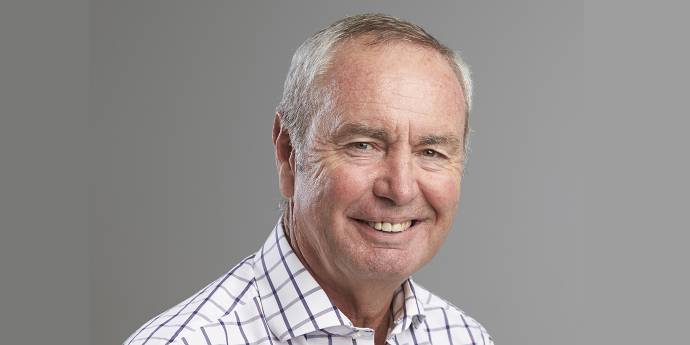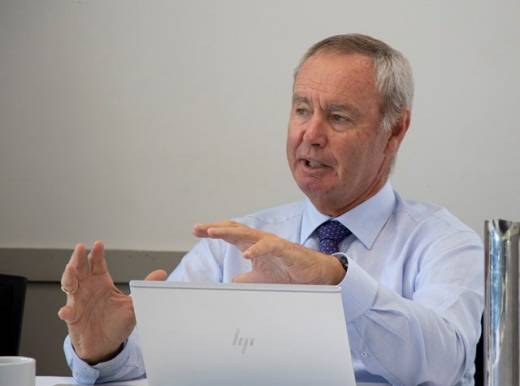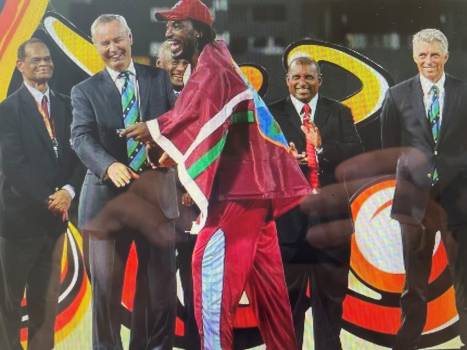Christmas wish granted for Pasifika leaders
Christmas has come early for 17 leaders of Pacific descent who have been selected for the Tautua Mentoring Programme 2025.
“I think these kinds of issues are on the board agenda all the time,” says former IoD president Alan Isaac CNZM of the recent New Zealand anti-mandate protests and Russia’s invasion of Ukraine.

With social, economic and political disruption here and abroad it is difficult for these issues not to be front of mind. For Isaac, the same holds true for boards.
“I had a board risk committee meeting and the whole issue of macroeconomics and geo-political issues were front and centre – and this is a business that's not necessarily even involved in exporting,” says Isaac, who serves on listed boards Oceania Healthcare Limited, Skellerup Holdings Limited and Scales - he chairs the audit committee on all three.
While the Ukrainian conflict may be happening on the other side of the world, the question looms large as to China’s relationship with Russia and how it might respond. New Zealand exporters are likely to be anxious as they wait.
“China is more likely to impact our economy because it’s our biggest trading partner and we’re becoming more and more dependent.”
Isaac says a lot of Kiwi export companies are also paying close attention to currency markets after the immediate drop when Russia invaded Ukraine. He says companies are managing that risk through their currency hedges.
“They will have policies that say they cover ‘X percent’ and there will be ranges they deal in, so when the currency dips they will be likely to take a little bit more cover,” he says.
Back on home turf, as deputy chair of Wellington Free Ambulance, on the day that anti-mandate protesters clashed with police at Parliament, Isaac felt close to the events as they played out when paramedics rushed to the scene.
"Wellington Free Ambulance has been closely involved in what's happened…it disrupted the ability for Wellingtonian’s to get an ambulance because there were more than 20 paramedics stationed in and around Parliament assisting the police on some days,” he says.
 Alan Isaac is still an active director.
Alan Isaac is still an active director.
Isaac is aware of the complex layers of issues presented by the protestors. A Wellingtonian, he visited near the grounds on day eight of the protest, and says he was shocked by the scale of what was taking place.
Isaac doesn’t necessarily agree with all the mandates that have affected people’s ability to work but believes businesses have done well through the pandemic in prioritising people’s safety.
“Business has got to survive for people to be employed and for the whole system to work,” he says of the constantly shifting demands and challenges around the pandemic.
Isaac has been involved with IoD and the Wellington branch for about seven years sitting on its council and last year finished his two-year term as President - a role he looks back on fondly.
“I found it a really rewarding experience because it grew from around 7,000 members to around 10,000.
Isaac is still very much involved in the world of governance, an avenue he never thought he’d pursue after he left a leadership role at KPMG. He laughs when he says governance was immediately where he found himself.
Fortunately for Isaac, he has been able to marry a governance career with his first love - sport.
He served as a director of NZ Cricket for 20 years from 1990 to 2010. In 2013 he received a Companion of the New Zealand Order of Merit for his contributions to cricket and business. And today, he chairs the New Zealand Community Trust and is on the audit committee of Sport New Zealand. He also chairs the Basin Reserve Trust.
 Alan Isaac trying to present the T20 Trophy to a dancing Chris Gayle.
Alan Isaac trying to present the T20 Trophy to a dancing Chris Gayle.
When talking to the role of boards it is no surprise that he loves to make a few sports analogies. The first one he draws from is rugby.
“If you're a flash boy on the wing the really good teams appreciate that you need the big strong guys up front,” says Isaac of how different roles in a team require mutual trust and respect.
Talking about how boards bring a culmination of skills together to form the best team, he says just as in cricket or rugby, acting as an individual in a team sport means you won’t survive.
But one glaring problem he points out today for those wanting to put their hands up for board roles - there simply are not enough board positions available.
He says with the multitude of ESG (Environmental, Social and Governance) issues emerging for boards and coping in these precarious times also means boards need highly proficient and experienced directors.
“If you go back to our Four Pillars, I’m not sure how you can undertake a lot of those roles if you haven't had experience,” he says.
One of the more recent focuses for boards in recent years has been board dynamics. Isaac says far too often people talk about appointing members who are ‘representative of the stakeholders,’ but says that is not what governance is about.
“I don't think you need a board that is going to serve the stakeholders. You need a board that has the most appropriate mix of skills and experience that is going to do best by the organisation,” he says.
He points to the importance of ‘oversight and protection’ of the organisation as core to any governance role.
“For example, if you're making products that harm the environment, in this day and age, no one is going to buy them. [If that’s the case] so you don't have a business.
“I feel quite strongly [that] aesthetics are not enough…Imagine if they said the All Blacks have got to look like this,” he says.
While that might be a bold statement, it is clear that ignoring diversity is not an option. While many emerging directors emphasise their strategic nous, Isaac says the board sets the strategy, but that the best ones are developed by the management team and presented to the board for discussion. The board then signs it off.
He relates back to sports and team culture, drawing comparisons to the function and role of boards.
“The chair of the board is like the head coach and the CEO is the captain. Inevitably in a good sports team you've got a leadership team. You hear about the All Black leadership group all the time…they develop and agree on a plan together with the coach, and they're always looking at succession.”